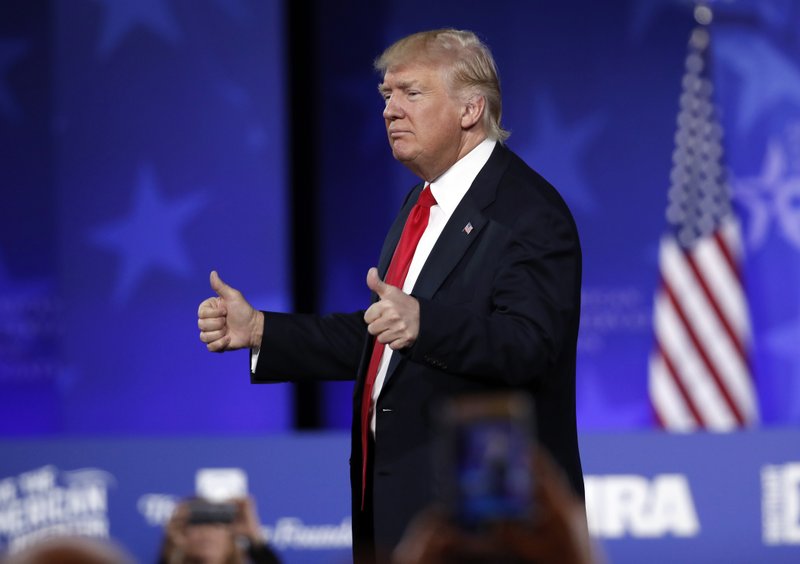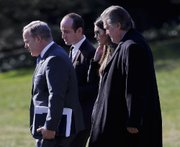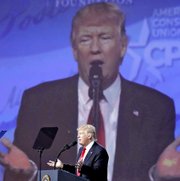WASHINGTON -- President Donald Trump unloaded on the news media Friday for using anonymous sources -- just hours after members of his own staff insisted on briefing reporters only on condition their names be concealed.
Unleashing a line of attack that energized an enthusiastic crowd at the nation's largest gathering of conservative activists, Trump said unethical reporters "make up stories and make up sources."
"They shouldn't be allowed to use sources unless they use somebody's name," he declared. "Let their name be put out there."
Trump told the Conservative Political Action Conference that while not all reporters are bad, the "fake news" crowd "doesn't represent the people. It will never represent the people, and we're going to do something about it."
[PRESIDENT TRUMP: Timeline, appointments, executive orders + guide to actions in first 100 days]
He also mocked journalists for claiming free speech rights. "They always bring up the First Amendment," Trump said to cheers. "Nobody loves it better than me."
Trump didn't expand on what he had in mind or which news organizations he was talking about. But his broadsides represented an escalation of his running battle against the media, which he and his allies have taken to calling "the opposition party."
The president has chafed at a number of anonymously sourced stories, including numerous reports describing contacts between his campaign advisers and Russian intelligence agents, which the White House has sharply disputed.
However, members of his White House team regularly demand anonymity when talking to reporters. That was the case Friday morning when Trump officials briefed reporters on Chief of Staff Reince Priebus' contact with top FBI officials concerning the Russia reports.
Later Friday, after Trump's speech, several news organizations, including The New York Times, the Los Angeles Times, CNN, BuzzFeed News and Politico, were blocked from joining a White House media briefing, according to news reports.
CNN's Sara Murray went on the air to describe what happened.
"We lined up. We were told there was a list ahead of time, which is sort of abnormal, but we put our name on a list. And then when we went to enter, I was blocked by a White House staffer who said we were not on the list for this gaggle today." A press gaggle refers to an informal media briefing in which White House spokesmen may speak to reporters on the record but may not be video-recorded.
"What the White House was doing was handpicking the outlets they wanted in for this briefing. So Breitbart, The Washington Times, the One America News Network -- news outlets that maybe the White House feels are more favorable were all allowed in, whereas I was blocked from entering, Politico was blocked from entering, The New York Times, the LA Times. All of these news outlets were blocked from going to a gaggle."
Noah Bierman, a White House reporter for the Los Angeles Times, also was barred.
"It was clear that they let in a lot of news outlets with less reach who are Trump-friendly," he said. "They let in almost every network but CNN. That's concerning, the handpicking aspect of it."
Journalists from ABC, CBS, The Wall Street Journal, Bloomberg News and Fox News were allowed to attend.
Representatives of the barred news organizations made clear that they believed that the White House's actions Friday were punitive.
"Apparently this is how they retaliate when you report facts they don't like," CNN said in a statement.
Dean Baquet, the executive editor of The New York Times, said in a statement that "nothing like this has ever happened at the White House in our long history of covering multiple administrations of different parties. We strongly protest the exclusion of The New York Times and the other news organizations. Free media access to a transparent government is obviously of crucial national interest."
Ben Smith, editor-in-chief of BuzzFeed, called it "the White House's apparent attempt to punish news outlets whose coverage it does not like."
White House Correspondents' Association President Jeff Mason called in to CNN to say the organization is "still getting information about" the decision.
"They clearly wanted to have a gaggle that was not on camera and was not the full press corps today. We don't object to there being briefings like that that aren't always on camera, but we have encouraged them when they want to do something like that ... [to] still do it in the pressroom and do it in a place where all the reporters have a chance to ask questions."
He added, "We're not happy about how this happened today."
Sarah Huckabee Sanders, a White House spokesman and the daughter of former Arkansas Gov. Mike Huckabee, played down the events in an email Friday afternoon.
"We invited the pool so everyone was represented," Sanders wrote. "We decided to add a couple of additional people beyond the pool. Nothing more than that."
The Associated Press and Time magazine chose not to participate after the move by White House spokesman Sean Spicer. Lauren Easton, The Associated Press' director of media relations, said in a statement: "The AP believes the public should have as much access to the president as possible."
As for Trump's criticism of anonymous sources, Gregg Leslie, legal defense director for the Reporters Committee for Freedom of the Press, said such arrangements are "essential to good reporting" in many cases.
"There are just some things that people will come forward about anonymously that they cannot discuss openly," Leslie said, citing potential threats to jobs and even personal safety.
The Associated Press says it uses anonymous sources only if the material is factual information, not opinion or speculation, and is vital to the news report. It must come from a person who is reliable and in a position to have accurate information.
Long ago, Trump himself played fast and loose with sourcing. In the 1990s, when his personal life was tabloid fodder, a "spokesman" who identified himself as John Miller would call to offer details about the businessman's failing marriage and the girlfriends he was juggling. But The Washington Post reported it was actually Trump posing as his own publicist. In later years Trump denied it, but he had owned up to it at the time, describing the Miller calls as a "joke gone awry," according to the Post.
'loved the commotion'
At the Conservative Political Action Conference, attendees said the event was enlivened by Trump's appearance.
Elizabeth Connors of New York recalled past gatherings as collections of the "downtrodden."
Today, she said, "it's energized" after years in which "we've been just pushed down, pushed down, pushed down."
Nicholas Henderson of Coeur d'Alene, Idaho, was there in his "Make America Great Again" hat and pronounced Trump's speech rousing.
"He touched on a lot of things we'd already heard before, which is reassuring, tells us he's still committed to those promises he made during the campaign," Henderson said.
Trump, who first appeared at the conference as a reality TV star six years ago, recalled his past visits with nostalgia, saying the crowd helped put him on the path to the presidency.
"If you remember, it was my first major speech. They said he didn't get a standing ovation -- because everybody stood," Trump said of his 2011 speech. "I had very little notes and even less preparation," he said of that first speech. "And then you leave, and everybody is thrilled and I say 'I like this business.'
"I loved the commotion," he said. "And then they did these polls where I went through the roof and I wasn't even running, right? But it gave me an idea."
From there, Trump's latest speech played out like a greatest hits reel from his 2016 campaign.
He reminisced about his victory in the Republican primaries. He vowed to "build the wall" along the Mexican border. He denounced Hillary Clinton's characterization of some of his supporters as belonging in a "basket of deplorables."
The crowd responded to his Clinton criticism with chants of "Lock her up!" just as they did at Trump rallies last year.
Trump departed the stage to the Rolling Stones' "You Can't Always Get What You Want," the same exit music he used during his campaign.
After his newest jibes, Trump turned his speech into a recitation of his top agenda items, promising bold action on health care, trade, immigration, energy and more.
"One by one, we're checking off the promises we made to the American people," he said, telling the crowd, "I will not disappoint you."
He told the conservatives the health care law he inherited from President Barack Obama threatens to bring about "total catastrophe," reiterating his promise to repeal and replace it. On illegal immigration, he said that "as we speak today, immigration officers are finding gang members, drug dealers and criminal aliens and throwing them the hell out."
He promised changes to the welfare system, saying, "It's time for all Americans to get off welfare and get back to work," adding that: "You're going to love it."
Information for this article was contributed by Nancy Benac, Mary Clare Jalonick, Jonathan Lemire and Julie Bykowicz of The Associated Press; by Callum Borchers of The Washington Post; and by Michael M. Grynbaum, Glenn Thrush of The New York Times.
A Section on 02/25/2017



